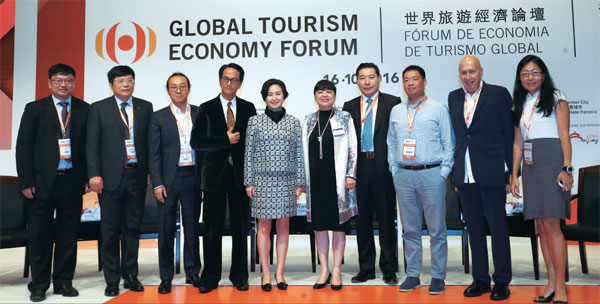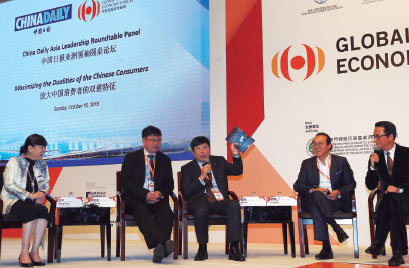Tourism boom likely to face fresh hurdles
Updated: 2016-10-19 07:06
By Zhou Mo in Macao(HK Edition)
|
|||||||||
Slowed economy, weaker currency threaten to stall industry's growth, warn experts
China's tourism industry has been invigorated by a growing middle-class and a freer flow of information, bringing a raft of opportunities for industry operators. However, economic factors and the currency depreciation stand as challenges to its continued development, scholars and industry experts told a roundtable forum in Macao on Sunday.
The change in the burgeoning industry is evident in Chinese tourists' preference for quality of travel, compared to previously being enamored with a rushed trip packed with sightseeing and shopping.
"In the past, Chinese tourists mainly visited tourist attractions. But now, they are engaged more in the local lives of the destinations," China Tourism Academy President Dai Bin told the China Daily Roundtable Forum themed "Maximizing the Dualities of the Chinese Consumers".
Fewer Chinese tourists are choosing to travel in tour groups as many people now consider individual travel to offer a better experience. Statistics show that of the 4 billion trips Chinese tourists made to domestic locations last year, 3.2 billion were classified as individual travel.
Wang Ping, chairperson of the China Chamber of Tourism, said this shift can be attributed to the growth of the Chinese middle-class.
"This group of tourists, which is well-educated and advanced in mindset, is concerned about quality of life and is willing to consume. Instead of traditional travel packages, they hope to get customized services," she said.
Free flow of information also plays a part, added Lyu Gang, co-founder and chief operating officer of Mafengwo.com, an online travel sharing platform.
|
(From left) Bao Jigang, director of the Monitoring Centre for Sustainable Tourism Observatories at the United Nations World Tourism Organization; Dai Bin, president of the China Tourism Academy; Lyu Gang, chief operating officer and co-founder of Mafengwo.com; Alexanda Wan, moderator; Pansy Ho Chiu-king, vice-chairperson and secretary-general of the Global Tourism Economy Forum; Wang Ping, chairperson of the China Chamber of Tourism; Wang Yanling, chairman of Beijing 798 Creative Industry Investment Co; Yan Haifeng, co-founder and president of Tuniu Corporation; Allan Zeman, chairman of Lan Kwai Fong Group; and Zhang Mei, founder of WildChina, pose at the China Daily Roundtable Forum themed "Maximizing the Dualities of the Chinese Consumers" in Macao on Sunday. Photos By Edmond Tang / China Daily |
"The biggest difference between the old generation of tourists and the new one is that they obtain information in a different way," he said.
"Previously, all the information came from newspapers or travel agencies and the information is standardized. Now, tourists can share their experience and suggestions with each other online, enabling others to plan for a customized trip that suits them."
China in the lead
According to government data, the Chinese domestic travel market was valued at 3 trillion yuan ($445.4 billion) last year and outbound consumption per capita amounted to 11,625 yuan. China already leads the world in the number of domestic and outbound tourists, as well as consumption both domestically and internationally.
|
Panelists have their ears glued to the discussions at the China Daily Roundtable Forum in Macao. |
This has offered many opportunities for service providers, noted Zhang Mei, founder of WildChina, which provides customized and experiential travel of Chinese culture and nature.
"The tourism market has become more subdivided. As long as industry insiders know exactly what they can offer and what they are good at and then focus on the specific point, there are endless opportunities waiting for them," she said.
Wang Yanling, chairman of Beijing 798 Creative Industry Investment Co that operates the popular 798 Art District in Beijing, said cultural consumption will become a strong driver for tourism growth. He pointed out that the arts sector will rapidly develop when a country's GDP per capita reaches $10,000.
Chinese GDP per capita reached $8,016 in 2015 and is expected to surpass $10,000 within the next few years, he said.
According to Wang, more than 4 million people visited 798 Art District last year, with 1 million of them being international visitors. A CNN survey showed that the art district has been Beijing's second most popular tourist destination after the Great Wall since 2007.
While many experts are optimistic about the future of tourism, some others take a more conservative attitude, saying that economic, currency and other factors may affect the industry's development.
Chinese outbound tourism is expected to see remarkable changes in the next three to five years, with the level of consumption declining due to currency depreciation and high home prices, said Bao Jigang, director of the Monitoring Centre for Sustainable Tourism Observatories at the United Nations World Tourism Organization.
The reduction in consumption of roughly 75 million people, affected by the "eight-point rules" issued by the central government to crack down on corruption, will also result in shrinking demand for travel, he added.
Meanwhile, Lan Kwai Fong Group Chairman Allan Zeman warned that the Hong Kong dollar's peg to the US dollar is undermining the city's capability of attracting tourists.
"At the moment, shoppers and tourists are very price-conscious. They can check what the best price is and they all do that. They all go online, they go to Taobao, Tmall and other websites," he said, suggesting the peg issue be examined in order to seek out solutions to make Hong Kong more competitive.
But the bright spot is that many industry operators have recognized the challenges and are making efforts to tackle them. "Chinese tourism enterprises used to focus only on the local market, but they are now on the way toward globalization," said Yan Haifeng, co-founder, president and chief operating officer of online travel agency Tuniu Corporation.
sally@chinadailyhk.com
(HK Edition 10/19/2016 page9)

